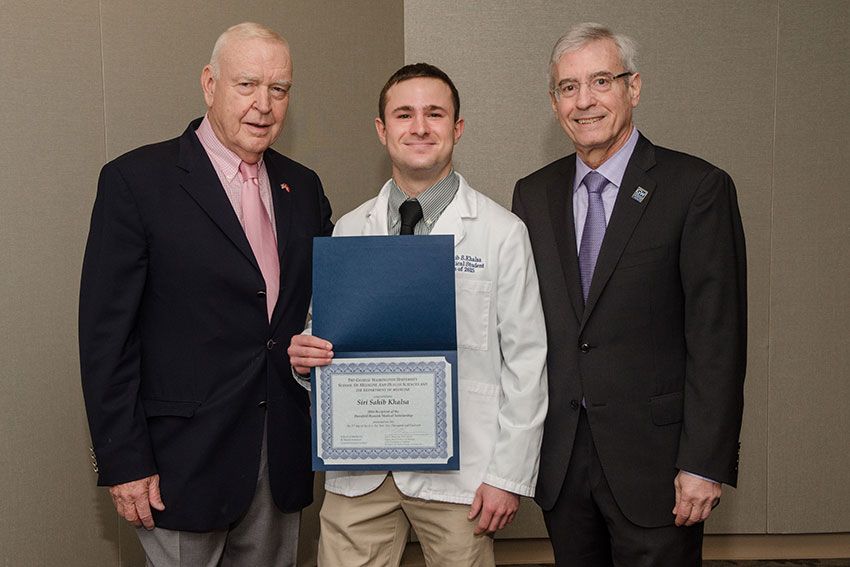
“What separated Leslie as a lecturer, prominent physician, and one of the most gifted diagnosticians I know was not his analytic ability, but his perseverance,” said Thor Stensrud, longtime friend of Leslie P. Dornfeld, M.D. ’63, and his wife Grazia. Stensrud spoke on the couple’s behalf as part of the Dr. Leslie & Grazia Dornfeld and Lynda & Stewart Resnick Endowment’s Fifth Annual Great Teachers in Medicine Lecture. The annual event was hosted by the Department of Medicine Grand Rounds and the George Washington University School of Medicine and Health Sciences (SMHS) on April 3.
Established in 2010 through the Dornfeld Trust, the endowed lecture honors and celebrates the medical career of Dornfeld and his passion for teaching the next generation of physicians. The annual lecture brings renowned clinicians to GW to discuss innovative topics and trends in medicine.
“Dr. and Mrs. Dornfeld are no longer with us, but their generosity and loyalty to GW lives on through this endowed lecture,” said Alan Wasserman, M.D., M.A.C.P., chair of the Department of Medicine and Eugene Meyer Professor of Medicine at SMHS, as he welcomed students, staff, faculty, alumni and residents.
Wasserman then awarded the Third Annual Medical Scholarship to third-year medical student Siri Khalsa. The award, which has been handed out at this event since the beginning, was presented to Khalsa for his academic excellence. “It’s an honor to be recognized, especially during a lecture as important as this,” he said.
The event was keynoted by Roslyn B. Mannon, M.D., professor of medicine and surgery and director of research of the Comprehensive Transplant Institute at the University of Alabama at Birmingham School of Medicine. “Our rate of transplantation in the United States is far smaller than the rate of listing for transplantation,” she said. “As of last year, all of the kidney transplants that were performed only equaled about 17,665. That is a large discrepancy to the individuals who are sitting on the waiting list.”
Mannon tailored her talk, “The Success of Kidney Transplantation and Challenges for the 21st Century,” to the medical students and residents in the audience by introducing the concept surrounding scarcity.
The discrepancy and scarcity of organs for transplant has led clinicians to perform a number of analyses. “There has been a significant drive for the expansion of living donors for both liver and lung,” she said. In addition, “there are ongoing changes in organ allocation, including a new kidney allocation scheme for the Kidney Donor Risk Index, Kidney Paired Donation Program, and desensitization of donor specific antibody in both living donor and wait-listed candidates.”
Mannon mentioned the new sources of organs that have recently been discussed in the mainstream media — stem cells, organ regeneration, and accelularized grafts. “Xenotransplantation, the transplantation of living cells, tissues, or organs from one species to another, is also back on the drawing board,” she said. There needs to be a push, explains Mannon, to maximize organ availability, improve potentially discarded organs, and create new organs.
“The waiting list for transplantation continues to grow, and the supply of transplantable organs has not been able to keep up with the demand,” said Mannon in closing. “Short-term patient and graft survivals are outstanding, but long-term results have not been optimized.”


